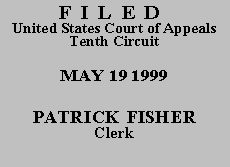

| RODNEY POWELL,
Plaintiff-Appellant, v. DANNY RAY CARTER, individually and as a member of the Hobbs Police Department; CITY OF HOBBS, Defendants-Appellees, and HOBBS POLICE DEPARTMENT; JOHN DOES, I-V; KEELING PETROLEUM, doing business as Fina Truck Stop, Defendants. |
|
Plaintiff Rodney Powell, an inmate appearing pro se, appeals from the district court's grant of summary judgment to defendants-appellees on his 42 U.S.C. § 1983 civil rights complaint for malicious prosecution and false arrest and false imprisonment in violation of the Fourth Amendment. Mr. Powell was arrested by Detective Danny Carter on a New Mexico robbery charge. He was found not guilty following a jury trial, and he is presently incarcerated on an unrelated matter. He sued the City of Hobbs and Detective Carter in his individual and official capacities.(1) We affirm.
"[T]he common law elements of malicious prosecution [are] the 'starting point' for the analysis of a § 1983 malicious prosecution claim." Taylor v. Meacham, 82 F.3d 1556, 1561 (10th Cir. 1996). In order to establish a malicious prosecution claim under § 1983, the plaintiff must also prove a Fourth Amendment constitutional violation. See id. "Under New Mexico state tort law, lack of probable cause to initiate criminal proceedings is an essential element of the tort of malicious prosecution." Wolford v. Lasater, 78 F.3d 484, 489 (10th Cir. 1996). "Probable cause for an arrest warrant is established by demonstrating a substantial probability that a crime has been committed and that a specific individual committed the crime." Id. Here, the district court granted defendants' motion for summary judgment, finding that, on the undisputed facts before it, probable cause to arrest Mr. Powell existed as a matter of law, thereby eliminating any constitutional basis for his false arrest, false imprisonment, and malicious prosecution claims.
We review de novo the district court's grant of summary judgment, viewing the record in the light most favorable to the party opposing summary judgment. See McKnight v. Kimberly Clark Corp., 149 F.3d 1125, 1128 (10th Cir. 1998). Summary judgment is appropriate if there is no genuine issue of material fact and the moving party is entitled to judgment as a matter of law. See Celotex Corp. v. Catrett, 477 U.S. 317, 322 (1986); Fed. R. Civ. P. 56(c).
After a de novo review of the parties' briefs and contentions, the district court's order, and the entire record on appeal, this court finds no reversible error. We agree with the district court's conclusion that defendants had probable cause to arrest Mr. Powell for the robbery and that Mr. Powell failed to establish that defendants knowingly or recklessly omitted from the arrest warrant information which was critical to the showing of probable cause. See Beard v. City of Northglenn, 24 F.3d 110, 114 (10th Cir. 1994).
Mr. Powell contends on appeal that the district court erred in ruling on the summary judgment motion without reviewing a videotape of the robbery and other evidence he asserts are relevant to his claim. Defendants presented an affidavit demonstrating that they conducted a diligent search, but were unable to locate the videotape. There was no evidence that the videotape was lost or destroyed in bad faith. In light of the defendants' diligent, but ultimately unsuccessful search, it was proper for the district court to consider the evidence offered by the parties concerning the contents of the videotape, viewed in the light most favorable to Mr. Powell. See Fed. R. Evid. 1004. As to the trial transcripts and other materials Mr. Powell now argues on appeal should have been considered by the district court, we note that Mr. Powell failed to file an affidavit before the district court under Fed. R. Civ. P. 56(f) explaining why he could not respond to the summary judgment motion without additional discovery. Because Mr. Powell failed "to take advantage of the shelter provided by Rule 56(f) by filing an affidavit, there [was] no abuse of discretion in granting summary judgment" since it was otherwise appropriate. Pasternak v. Lear Petroleum Exploration, Inc., 790 F.2d 828, 832-33 (10th Cir. 1986).
Mr. Powell's motion for the appointment of counsel is DENIED. His motions to present on appeal additional evidence which was not presented to the district court are DENIED. The judgment of the United States District Court for the District of New Mexico is AFFIRMED for substantially the same reasons set forth in its order granting summary judgment dated July 17, 1998.
Entered for the Court
Circuit Judge
*. This order and judgment is not binding precedent, except under the doctrines of law of the case, res judicata, and collateral estoppel. The court generally disfavors the citation of orders and judgments; nevertheless, an order and judgment may be cited under the terms and conditions of 10th Cir. R. 36.3.
1. Mr. Powell's complaint named various other parties, but those parties have been dismissed by the district court and are not the subject of this appeal.